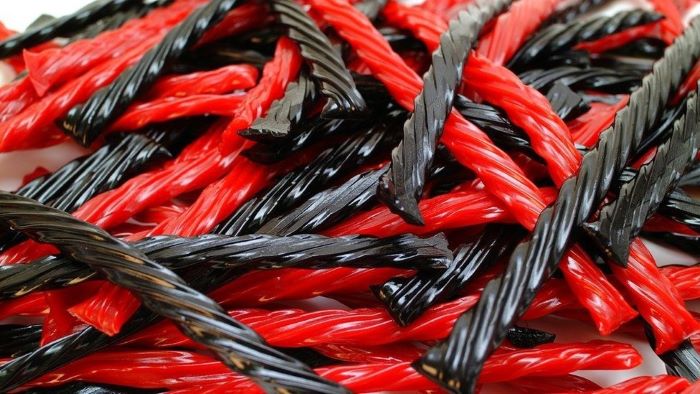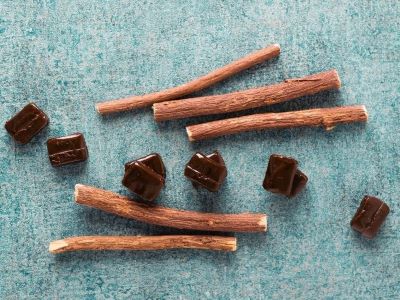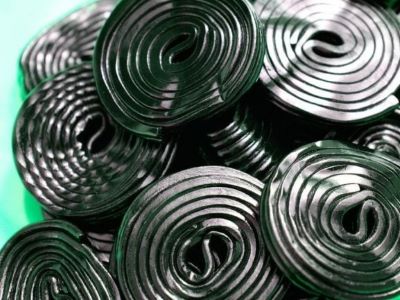Liquorice, with its unique sweet and earthy flavour, has captured the taste buds of humans for a long time. But, “Can dogs eat liquorice?” 🐶
Derived from the root of the Glycyrrhiza plant, this ancient treat has found its way into various delights and remedies. We humans love the tangy treat.
In this article, we are going to explore charms behind the this liquorice and also if is it safe for dogs or not. what are the other alternatives for the dog? So, grab a few liquorice, sit back and let’s dive into the food world.🐶

Can Dogs Eat Liquorice?
When it comes to sharing your favourite snacks with your dog, caution is the key. Liquorice is made of a compound called glycyrrhizin, which gives it that distinct sweet taste.
In dogs, excessive glycyrrhizin intake can lead to issues like mineral imbalances and low potassium levels. High levels of glycyrrhizin may lead to liquorice toxicity in dogs. Signs may include vomiting, diarrhoea, and even more severe difficulties in extreme cases[1].
Glycyrrhizin can affect the body’s cortisol levels, potentially leading to increased blood pressure.
Dogs with heart conditions or hypertension may be more vulnerable. Licorice candy often contains additives like artificial colours, sweeteners, and preservatives.
These additional components can be harmful to dogs, causing digestive issues and allergic reactions. Sugars, common in candy, pose a dual threat. They contribute to obesity and dental problems🦷 in dogs.
Diabetic dogs face an added risk due to the sugar content in liquorice treats. It’s crucial to be mindful of the human food that we are feeding our dogs.🐶

Health Effects
Let’s understand what may be health effects of liquorice on dogs:
- Liquorice consumption may lead to digestive problems in dogs, such as nausea, vomiting, and diarrhoea. The introduction of a new and potentially unfamiliar substance can disrupt a dog’s sensitive digestive system.
- Glycyrrhizin, the sweetening component in liquorice, can cause issues in dogs when consumed in excess. High cortisol can result in sodium and water retention, impacting various bodily functions.
- Glycyrrhizin-caused cortisol increase can lead to a decrease in potassium levels. Low potassium can trigger muscle weakness, tremors, and irregular heartbeats in dogs.🐶
- Increased blood pressure can be particularly problematic for dogs with heart conditions. Regular monitoring of blood pressure is crucial if your dog has a history of cardiovascular issues.
Always, consult with your vet before introducing new treats into your dog’s diet.
Moderation and Alternatives
While a small amount of liquorice on occasion may not pose an immediate threat, regular consumption increases the risk of adverse effects. Dogs should enjoy a balanced diet primarily consisting of nutritionally right dog food.

In this world full of a variety of foods moderation is the best thing. You can feed them the right foods in moderation, let’s see in detail:
Avoiding Habits
Refrain from making liquorice or similar human snacks a habitual part of your dog’s diet. Occasional treats can be reserved for special moments but should not replace essential nutrition.🐶
Opt for dog-friendly treats specifically made with their nutritional needs in mind. Choices like dog biscuits, dental chews, or specially designed treats provide a safer and more enjoyable snacking option.
Fruits and Vegetables
Many dogs appreciate fruits and vegetables as treats. Apples,🍎 carrots, or blueberries can be excellent alternatives to sweet treats.
Trustworthy dog treat brands offer a variety of flavours and textures to cater to your dog’s taste preferences while ensuring safety.
Individual Health Considerations
Every dog is unique, and their health needs may vary.
Consult with your veterinarian to understand your dog’s specific dietary requirements and potential sensitivities.

Professional Guidance
Veterinarians can provide specific advice on whether liquorice or specific treats are suitable for your dog’s age, size, and health condition. Regular check-ups allow for adjustments in the diet based on the changing needs of your dog.🐶
Regular consultations enable the early detection of any adverse effects that may not be immediately apparent. Timely adjustments to the diet can prevent potential health issues.
Moderation is the golden rule!
Signs of Liquorice Toxicity in Dogs
There are some common signs available of liquorice toxicity in dogs, let’s look at them in detail:
Early Warning Signs
If your dog vomits or has diarrhoea after eating liquorice, take quick action. These symptoms may signify liquorice toxicity. Persistent vomiting and diarrhoea can dehydrate your dog.
Watch out for their fluid intake closely and contact your vet if you notice signs of dehydration like lethargy or loss of skin.
Quick vet🥼 treatment is crucial. Stay alert and act fast at any signs of sickness after your dog ingests liquorice.
Excessive Water Consumption
If your dog suddenly drinks more water and urinates frequently, it may be liquorice toxicity. Liquorice can raise cortisol levels leading to increased thirst.
Liquorice also impacts blood pressure. Carefully monitor👀 dogs with heart conditions especially. Watch for signs like changes in behaviour or discomfort that could signal high blood pressure.

Keep a close eye on your dog after eating liquorice. Increased thirst, urination, or blood pressure changes are red flags.
Catching problems early and contacting your vet promptly can prevent small issues from becoming serious. Don’t take chances, be alert for symptoms. Your dog’s health is in your hands.
Weakness
Liquorice toxicity can cause weakness and lethargy in dogs. If your normally energetic dog becomes unusually lethargic, it could be a sign of an underlying issue.
Weakness may indicate a range of health issues, and seeking veterinary attention promptly can aid in proper diagnosis and treatment.
Vomiting, diarrhoea, increased thirst, high blood pressure, weakness, and lethargy are red flags that demand attention. If you suspect any sign then quickly consult with the vet to treat your dog immediately.🐶
FAQs
❓Can Dogs Eat Liquorice?
Furthermore, liquorice candy contains large amounts of wheat gluten, sugar, and high-fructose corn syrup, which can cause gastrointestinal issues, weight gain, water retention, and high blood pressure in dogs. To be safe, refrain from feeding this human food to your dog.
❓Why Does My Dog Like Liquorice?
Licorice contains a glycoside called glycyrrhizin that gives liquorice its sweet taste. Glycyrrhizin has antimicrobial, anti-inflammatory, and antioxidant properties. Its chemical structure is similar to naturally occurring corticosteroids. It makes liquorice an excellent anti-inflammatory for dogs.
❓How Much Licorice Is Safe?
There is not a specific “safe” amount, but people with high blood pressure or heart or kidney disease should avoid black liquorice, which could worsen these conditions. For people over 40, the FDA says that more than two ounces a day for two weeks may be problematic and cause irregular heart rhythm or arrhythmia.
❓Can Dogs Eat Licorice Twizzlers?
These twisted candies come in many colours and flavours and are made from the liquorice plant. Twizzlers are delicious and tempting to any dog, but your canine companion should avoid them. These sweet treats don’t have any nutritional value that a dog needs and will only make them sick if consumed in large amounts.
❓Is Black Liquorice Safe?
Eating more than 57g (2 ounces) of black liquorice a day for at least 2 weeks could lead to potentially serious health problems, such as an increase in blood pressure and an irregular heart rhythm (arrhythmia).
Conclusion
In conclusion “Can dogs eat liquorice?” While occasional treats may not be bad, including this in their regular diet may not be a good idea. 🐶
Your dog may look at you with those puffy eyes and think “Please break off a little bit of that tasty treat! I promise not to beg again…for at least the next 10 minutes” But remember it is for their good only.
In this journey moderation is the hero. After all a healthy dog is a happy dog.
Reference:
- Licorice-induced apparent mineralocorticoid excess causing persistent hypertension and hypokalemia | NIH



